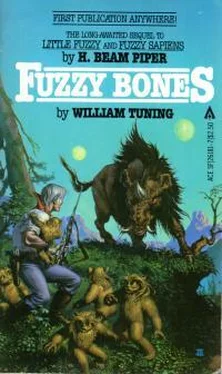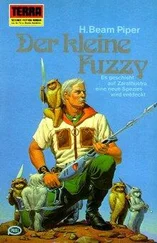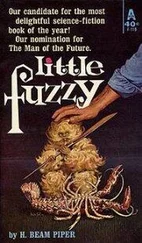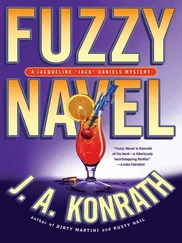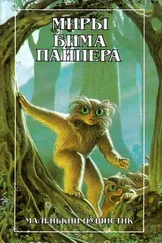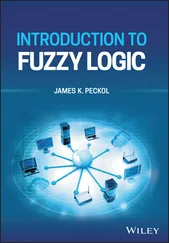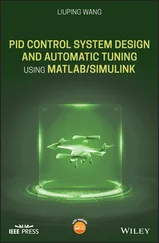"Luncheon would be a good time," Grego said. "I 'd like to attend, myself, if that's all right."
"Why, of course, Victor," Rainsford said. "I was hoping you'd say that. I may be the Colonial Governor General, but that's only been for a year. If both of us tell all of them it's a good idea, I'm sure they'll all go for it."
After Ben Rainsford had left with Flora and Fauna, Diamond yawned and stretched in the foyer, then climbed up into Grego's lap. "What you talk with Unka Ben, Pappy Vic?" he asked.
"Business, Diamond," Grego answered. "About ways to do a better job of catching bad Big Ones."
"Tosh-Id-Hagga?" Diamond asked, "like the Big Ones who brought me here from the big woods?"
"That's right," Grego said. "It's an awfully big job."
Diamond squirmed around until he was comfortable on Grego's ample lap. "Not so bad-the way it work out," he said sleepily.
Grego thought about the way Diamond had been kidnapped by Herckerd and Novaes and held prisoner until he escaped. "So-noho~ald dovov tosk-ki," Grego said.
You tell me how not bad.
Diamond yawned, again. "If not come here, no find Pappy Vic," he said. "No find you hoksu-hagga- wonderful big one."
Grego scratched the back of Diamond's head, between his ears. In a moment he set down his brandy snifter and brushed something out of the corner of his left eye.
Chapter 9
They were in Jack's living room, and it looked almost exactly as it had the first night Gerd van Riebeek had seen it, when he and Ruth and Juan Jimenez had come out to see the Fuzzies, without the least idea that the validity of the Company's charter would be involved.
All the office equipment and supplies and files that had cluttered Jack Holloway's home right after the Pendarvis Decisions were long since cleared out into the Administration Office buildings. Now there was just the sturdy, comfortable furniture, which Jack had built himself, the damnthing and
bush-goblin and veldbeest skins on the floor, and the gun-rack with a tangle of bedding under it where his own family of Fuzzies slept. The other Fuzzies didn't intrude here-they understood it was private to Pappy Jack's Fuzzies.
There were only four people present-soon to be joined by another: Jack and the van Riebeeks as before; and Lynne Andrews, slender and blonde and sitting on the couch where Juan Jimenez and Ben Rainsford had sat that first night. Jack sat in the armchair at his table-desk, trying to keep Baby Fuzzy, on his lap, from climbing up to sit on his head.
"We 're getting closer, but there's an enormous amount of information we don't have yet," Gerd was saying. "The Fuzzy infant mortality rate is running something like ninety percent. The NFMp hormone inhibits normal development of the fetus every time-" He pointed to the example of Baby Fuzzy. "-except when the NFMp production cycle is out of phase with the mother's fertility cycle."
"How many viable infants are there in Fuzzy-shelter, now?" Jack asked.
"Seven, "Ruth answered. "Since we set up the lab, we've had sixty-two deliveries. Fifty-five of those have been stillbirths, live births that die within hours, or preemies who aren't strong enough to stay alive, even in incubators. The mothers with healthy babies have been kept here, so we can study their kids-even if there aren't enough of them for a decent sample group."
Jack nodded as he arranged the information in his mind. "Good-actually, not good. What I mean is that it's good you're retaining the Fuzzies with viable offspring, instead of letting them disappear into the adoption pool. Do you have an infant experimental group getting large doses of hokfusine, as well as the adult sample?"
"Yes," Lynne said, "but it's too soon yet to measure any differences in development." Lynne had been shanghaied from the hospital in Mallorysport, where her practicing M.D. was in pediatrics. She still hadn't completely shaken off the notion of equating Fuzzies with human children about one year of age; they were much the same size. Some of them, of course, were older than she was, but the present state-of-the-art Fuzzyology didn't include any method of age-determination. And Fuzzies had a very cavalier attitude about numbers: they counted to five on the fingers of one hand, using the other hand to count with. Then they counted past that to a "hand of hands"-twenty-five. After that it was "many," and somewhere beyond that it was simply "many-many." "Many-many summers" of age wasn't very satisfying to a scientist trying to set up research records.
"Hell, Jack," Gerd said. "We're not even real sure what the gestation period is for Fuzzies, much less what their growth rates and mental development schedules are. We have some adolescent Fuzzies. We have some pubescent Fuzzies. And we have adult Fuzzies. But we have no Fuzzies who can give us precise elapsed-time information about their own life cycles. We'll just have to skull it out for ourselves by observation of experimental groups. We've got a long job ahead of us, here."
Jack asked, "Do we know anything definite yet about how they use hokfusine-more than that they metabolize it into something that inhibits NFMp production?"
"We think it's like a vitamin to them," Lynne said. ' "They prefer eating land-prawns over anything else, because of the titanium in its middle intestine. But the molecule isn't the same as the hokfusine molecule. They can't convert it into anti-NFMp, even though they're very fond of the taste it
gives the land-prawn. We're making a series of endocrine comparisons now to determine what's involved with the titanium in hokfusine that allows its conversion into anti-NFMp and doesn't allow the titanium in land-prawns to be converted." She gave a short laugh. "You have to understand, though, that when I say endocrine system for Fuzzies, that's only the vaguest kind of label; we have precious little information on the subject at this point."
Land-prawns were very important to Fuzzies and a great nuisance to Terrans.
They got into gardens; they got into machinery; they got into campsites; they got into bedding- painfully pinching the owner of the bedding when he tried to get into it. They got into wiring and ate the insulation; they got into dirty laundry and ate holes in your socks.
What the Terrans called a land-prawn the Fuzzies called a zatku; a big pseudo-crustacean, about a foot long, twelve-legged and possessed of two pairs of clawed mandibles. Fuzzies hunted zatku avidly and preferred them to any other food-until they tasted EMERGENCY FIELD RATION, EXTRATERRESTRIAL SERVICE
TYPE THREE. Fuzzies liked zatku, but they loved Extee-Three. If it hadn't been for the land-prawns starting to move south into the big woods to get away from a drought, the Fuzzies would have stayed in the unexplored country of northern Beta Continent and it would have been years longer before any Terran made contact with them.
At first, it was a mystery why Fuzzies were crazy about Extee-Three, until the greater mystery developed of why they loved some Extee-Three and spit out other Extee-Three when both had been prepared identically.
Actually, almost identically.
A Company Science Center chemist named Charlotte Tresca had proceeded along completely unscientific lines and found that Fuzzies were nuts about only Extee-Three that had been prepared in titanium cookers. It contained a molecule, mostly carbon-oxygen-hydrogen, with five atoms of titanium hooked onto it. Sixty-four atoms in the long-chain organic molecule; five of them titanium. The molecule amounted to about one part per ten million of the Extee-Three.
Fuzzies could tell the difference by taste.
Pretty keen tasting.
Ms. Tresca had named the molecule hokfusine, from the name for Extee-Three in Lingua Fuzzy-hoksu-fusso, wonderful food. That had annoyed the lab chief no end; Dr. Jan Christiaan Hoenveld had planned to name the substance hoenveldine, thus assuring his niche in scientific history, but the term hokfusine was already in widespread usage before he could make up his mind that Charlotte Tresca's research was valid.
Читать дальше
